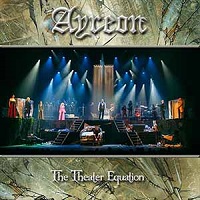Self-proclaimed recluse Arjen Anthony Lucassen, the Dutch musician, composer, producer and creative mastermind behind the progressive rock project Ayreon, has repeatedly said he prefers writing and recording albums from the privacy and comfort of his home studio rather than going out on tour and brining his musical creations to the stage. Even if he had the desire to play live, the complex logistics of coordinating rehearsing and touring schedules between the many guest musicians and vocalists featured on Ayreon albums would make it nearly impossible. Despite endless fan requests for a live performance, it would seem Ayreon’s progressive rock concept albums would have to be enjoyed from a studio album perspective. Until now, that is.
The Theater Equation sees Lucassen and a host of guest musicians and vocalists (many reprising their roles from the original album) bringing Ayreon’s sixth studio album The Human Equation to life and to the stage for a special performance that feels more like a full-blown theatrical production than just a live concert. Although there are multiple formats for the release, including a live DVD and Blu-ray, this review focuses on the live CD portion. Without having seen the accompanying visual component, the feel of a full theatrical stage production still comes through on the CDs, thanks in part to a crystal clear production that captures every sound from bright flute refrains and thudding bass lines to crisp acoustic guitar passages and violin and cello strains.
Vocalists reprising their original roles include: James Labrie (Dream Theater) as Me; Marcela Bovio (Stream of Passion) as Wife; Magnus Ekwall (The Quill) as Pride; Irene Jansen as Passion; Heather Findlay (ex-Mostly Autumn) as Love; Eric Clayton (Saviour Machine) as Reason; and Devon Graves (Dead Soul Tribe) as Agony. New vocalists filling in for those not available for the live performance include: Anneke van Giersbergen (ex-The Gathering) as Fear, originally portrayed by Michael Akerfeldt (Opeth); Jermain “Wudstik” van der Bogt as Best Friend, originally portrayed by Lucassen; and Mike Mills as both Rage and Father, originally portrayed by Devin Townsend and Mike Baker, respectively.
Backing up the vocalists and providing the soundtrack to the story are the following musicians: longtime Lucassen collaborator Ed Warby (Gorefest, Hail of Bullets) on drums; Johan van Stratum (Stream of Passion) on bass; Marcel Coenen (Sun Caged) and Freek Gielen on guitar; Erik van Ittersum and Ruben Wijga (ReVamp) on keyboards; Jeroen Goossens on flutes and woodwinds; Ben Mathot on violin; and Maaike Peterse (Kingfisher Sky) on cello. Joost van den Broek (ex-After Forever) serves as the musical director. As if the multitude of guest vocalists and musicians weren’t enough, a 19-member Epic Rock Choir was used for backing vocals instead of conventional backing vocalists or digital backing tapes, which only served to heighten the power of the performance.
As the man battles various emotions throughout his unconscious state, a variety of musical themes and styles are represented as new characters are introduced and the story unfolds. The gothic-like “Day Two: Isolation” features a haunting melody, crunchy guitars and swirling keyboards (think Tristania meets Therion), while the folky ballad, “Day Five: Voices,” is highlighted by violin and flute. Similarly, the somber, Celtic-like “Day Thirteen: Sign” begins with some acoustic guitar and flute before the violin and cello take over. Conversely, “Day Twelve: Trauma” is a brooding doom-like number in the vein of Candlemass or Sorcerer. “Day Fourteen: Pride” is propelled forward by heavy, distorted guitars, while the dirge-like “Day Fifteen: Betrayal” slows the tempo in favor of a melancholy melody that reminds of Ahab.
But perhaps the most unique offering is “Day Sixteen: Loser,” which sounds like something Devin Townsend would have concocted, with its bouncing rhythm, playful carnival melody (think Nightwish’s “Moondance”), and some shredding guitar and keyboard runs for good measure. Mike Mills’ vocal performance on “Loser” must be highlighted, as he finds a way to portray both Father and Rage while keeping each distinct within the same song.
Live albums can be hit or miss, as some fans prefer to stick to studio efforts while others enjoy all the imperfections and spontaneous moments that make live recordings unique. Whatever your preference, you would do well to pick up The Theater Equation, as a great deal of time, effort, and energy have gone into making this once-in-a-lifetime Ayreon performance a true gem of a release.


